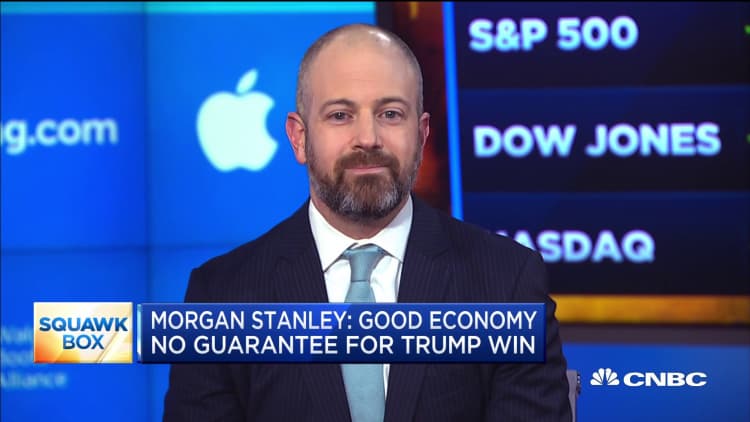
Investors should not assume that President Donald Trump will stay in the White House just because of the strong U.S. economy, according to an analysis from Morgan Stanley.
Michael Zezas, head of U.S. public policy strategy at the Wall Street firm, acknowledged Tuesday that "as far back as we have reliable data" incumbent presidents with "good economies are reelected."
However, Zezas argued on "Squawk Box" that the sample size of just 45 presidents is small. "It's entirely possible that it's a coincidence," he offered, referring to any such correlation between reelection and the economy.
Historically, presidents who ran for reelection while the economy was booming, including Barack Obama, George W. Bush, Bill Clinton and Ronald Reagan, kept their jobs. Meanwhile, Presidents George H.W. Bush, Jimmy Carter, Gerald Ford and Herbert Hoover lost their reelection bids amid U.S. economic struggles.
The economy, which was on fire in 2018, has been cooling lately, under the weight of the U.S.-China trade war.
But despite the tariffs, now on hold as a phase one deal awaits signing, American consumers have generally weathered the storm. The nation's 3.5% unemployment rate in November matched 50-year lows.
The Federal Reserve, despite Trump's frequent bashing and calls for lower interest rates, also delivered three rate cuts in 2019 to inoculate the U.S. economy from the worldwide slowdown.
The stock market, as measured by the S&P 500, since Trump's 2016 election victory was up more than 50% as of Wall Street's close on Monday.
However, Zezas said Trump is missing something that those past good-economy incumbent presidents had: Stronger job approval than disapproval. "All of those that had good economies also had net positive approval rating."
That makes Trump a standout.
"Now we have a president with a good economy who's never had a net positive approval rating," Zezas added, referring to the difference between the approval and disapproval ratings.
Trump's approval rating hovers around 45%, according to a data compilation from RealClearPolitics, with disapproval at more than 52%. That translates into a net negative spread of about 7%.


